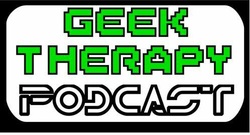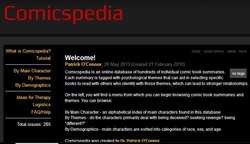This is not the first year I have attended the San Diego Comic Con but it is the first year that I am THIS thrilled to attend. Above all panels, the one that I am most looking forward to is the Geek Therapy panel, scheduled to take place on Thursday at 12:00 pm in room 26 AB, where most of the magical geeky-nerdy stuff to do with psychology and geek culture will take place.
 The panel will be lead by Josué Cardona, a licensed professional counselor from North Carolina, is the high leader of the Geekie award winner podcast, Geektherapy. On his podcast, Mr. Cardona interviews professionals about their use of comic book, games, technology, and other geeky stuff to help with their patients, as well as people who have been helped by the geek culture, such as Richard, whose life was saved by comic books, preventing him from committing suicide . Mr. Cardona’s podcasts are both moving and educational and something every mental health professional and educator should listen to.
The panel will be lead by Josué Cardona, a licensed professional counselor from North Carolina, is the high leader of the Geekie award winner podcast, Geektherapy. On his podcast, Mr. Cardona interviews professionals about their use of comic book, games, technology, and other geeky stuff to help with their patients, as well as people who have been helped by the geek culture, such as Richard, whose life was saved by comic books, preventing him from committing suicide . Mr. Cardona’s podcasts are both moving and educational and something every mental health professional and educator should listen to.
As a psychologist and a full-time geek, the Geek Therapy panel is an absolute dream come true. Growing up addicted to reading, I’ve been psychoanalyzing fictional characters ever since I can remember. The truth is that many of us have an easier time relating to fictional characters than we do to real life people. There are a number of reasons for this. First of all, it is easier to really get to know a fictional character since as a reader, we can get into the character’s head and understand his (or her) intentions. The more complex the character is, the more values and imperfections he has, the more he reminds us of our own experiences, the more we can relate to him. On the other hand, people in real life tend to hide their vulnerabilities, they tend to have a different personality (persona means “mask” in Latin) when around other people and tend to hide their true self. We all do it, we behave according to the social norms, we smile when we are sad, we answer that we are “fine” when asked “how are you” because to tell the truth would be to violate a rule, and to violate a social rule would make us an outcast.
Due to the fact that most people tend to hide what they believe to be their “flaws” (such as pain, sadness, fear, and anxiety), the experience of such painful sensations can be alienating. This is only intensified by some of the unrealistic expectations that are dictated to us by society, such “big boys don’t cry,” “emotions = weakness,” or the sometimes implied “people who are depressed are crazy or have mental problems and need medications.” The truth is that we all feel sad sometimes, we all have our own struggles to face, and we all need a hero in our lives to look up to.
This is where comic books (and other books) can be very helpful in therapy. For example, someone who is grieving over a tragic loss, might also find him or herself at a loss of words and unable, and even unwilling, to describe what he or she is going through. However, if that person was to read a story where a character also experienced a tragic loss, such as Year 1 by Frank Miller, where Miller revisits the way that Bruce Wayne (Batman) witnessed the murder of his parents as a child, then suddenly, it might become easier for the patient to describe what he or she is feeling. This connection with a comic book character can make the patient feel less alone and can allow for more open discussions and potentially better progress in therapy.
 Chicago psychologist, Dr. Patrick O’Connor, PsyD used comic books to relate to a teenage gang member in similar fashion, which allowed for improved collaboration during therapy. Dr. O’Connor created an entire database, Comicspedia, which contains hundreds of comic book summaries, sorted by theme, main character, and even cultural demographics, and is exactly what the psychology community needed. On this data base, psychologists (and other users) can find the comic book issue summary that is most relevant to them. For example, someone who is a fan of Captain America comics, who is struggling with loss and grieving, can potentially relate to their favorite superhero when reading issue 10 volume 4, where Captain America recalls his own painful loss.
Chicago psychologist, Dr. Patrick O’Connor, PsyD used comic books to relate to a teenage gang member in similar fashion, which allowed for improved collaboration during therapy. Dr. O’Connor created an entire database, Comicspedia, which contains hundreds of comic book summaries, sorted by theme, main character, and even cultural demographics, and is exactly what the psychology community needed. On this data base, psychologists (and other users) can find the comic book issue summary that is most relevant to them. For example, someone who is a fan of Captain America comics, who is struggling with loss and grieving, can potentially relate to their favorite superhero when reading issue 10 volume 4, where Captain America recalls his own painful loss.
I myself have used examples from comic books and fantasy fiction in my work with my patients. In working with patients who are hard on themselves about having anxiety, depression, or PTSD and believe themselves to be “weak” as a result, I try to engage them in a discussion about their favorite fictional or comic book character. For example, for someone who is a fan of The Hobbit and Lord of the Rings books, I might engage them in a discussion, which illustrates that one does not have to feel brave to be brave and assign reading from their favorite books in addition to standard practice assignments. The practice of assigning relevant reading in order to assist the therapy process is called bibliotherapy, where biblio means book. I believe that using comic books, fantasy, science fiction, and other books and movies as a part of bibliotherapy can greatly supplement the therapy process and allow for better understanding and improved relationship between the therapist and the patient.
I am greatly looking forward to learning more from the Geek Therapy panel and will share what I have learned on this blog.
Live long and prosper and may the force be with you!
Warmly,
Shadow Quill

One thought on “Why Comic Con?”